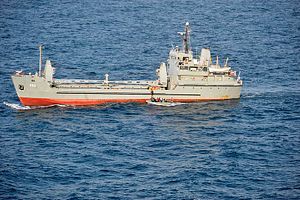This week, the commander of Iran’s navy made his first ever visit to China, Chinese media reported. Rear Admiral Habibollah Sayyari met with Chinese Defense Minister Chang Wanquan as well as Admiral Wu Shengli, commander of the PLA Navy. Sayyari’s trip to China is the latest sign of increased cooperation between the Chinese and Iranian militaries, and particularly their navies.
During their meeting, Wu told Sayyari that in recent years, China-Iran bilateral relations have “continued healthy development,” with a number of high-level exchanges deepening mutual truest. Wu then called for further progress in strengthening military-to-military ties, including more mutual exchanges, ship visits, cooperative personnel training and technological cooperation.
Likewise, Defense Minister Chang praised the recent cooperation between the two militaries and called for further cooperation and strengthening of military-to-military ties, Xinhua reported. Sayyari responded by saying Iran is “ready to enhance bilateral exchanges to push forward cooperation between the two armed forces, especially in naval cooperation.”
Sayyari’s visit to China comes roughly a month after Chinese warships made their first ever port call in Iran, which was also the first trip by Chinese military vessels to the Persian Gulf. The two nations conducted joint anti-piracy and search-and-rescue exercises. That visit came after Iranian vessels visited the Chinese post of Zhangjiagang in 2013. Remarks made during Sayyari’s visit confirm that more such exchanges and port calls are very much on the cards. If this week’s meetings are any indication, China-Iran military cooperation will become the new normal.
For China, closer ties with Iran are part of larger trend of finding military partners outside the immediate Asia-Pacific region. Working under the imperative of embracing “new historic missions,” the PLA and the PLAN have being expanding their operations abroad to match China’s growing national interests. Expanding the geographical reach of China’s military requires willing regional partners. Iran is an particularly attractive candidate for this cooperation due to its own military strength, its relative stability, and its estrangement from the West (particularly the U.S.). Better ties with Iran give China a window into the Middle East, a region where its interests are rapidly growing as its appetite for energy increases.
Even while Iran’s naval chief was in Beijing, representatives from Iran and the P5+1 powers continue to negotiate toward a final deal on Iran’s nuclear program. China is highly supportive of the talks and recently urged all parties to “inject more political willingness, impetus and creative thoughts into the negotiations, meet each other halfway, broaden consensus and strive for breakthroughs as soon as possible.”
Bloomberg, citing the French envoy to the talks, reports that it’s unlikely a final deal will be reached by the November 24 deadline. An extension, however, is possible (although it would have to overcome opposition from the U.S. Congress). Meanwhile, the warming China-Iran relationship will make it incredibly difficult for the U.S. to pressure Iran into accepting a deal. China’s own individual rapprochement with Iran is likely to continue regardless of the outcome of the nuclear talks, reducing pressure for Tehran to accept strict limitations on its nuclear program.
Frayed ties between Iran and the West might actually be a plus for China, as it’s easier for Beijing to establish military partnerships with countries that are suspicious of (or even outright antagonistic toward) the United States. A more intriguing question is how Beijing will navigate the fraught relationship between Iran and Pakistan, China “all-weather friend.”
As The Diplomat has covered, ties between Pakistan and Iran are tense right now after Iranian forces entered Pakistan last week and clashed with Pakistani border guards, killing one. Iran claims it crossed over to Pakistani soil to deal with militants that often enter Iran to conduct attacks. Islamabad has rejected these charges. As Akhilesh Pillalamarri noted in his article, the current tensions also reflect a new alignment between Pakistan and Saudi Arabia, one of Iran’s biggest regional rivals (along with Israel). If Iran-Pakistan ties continue to sour, it will take some careful political maneuvering for China to continue to deepen its own ties with Tehran without alienating a long-time ally.
































